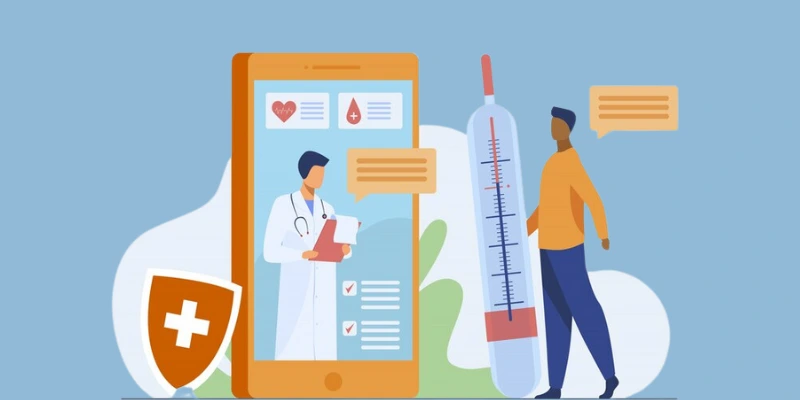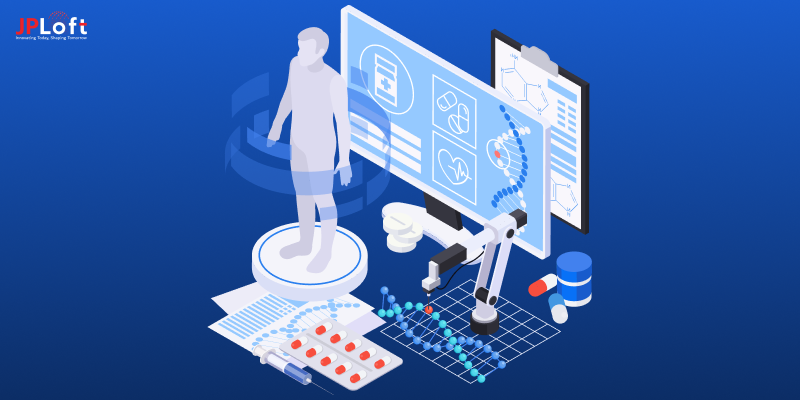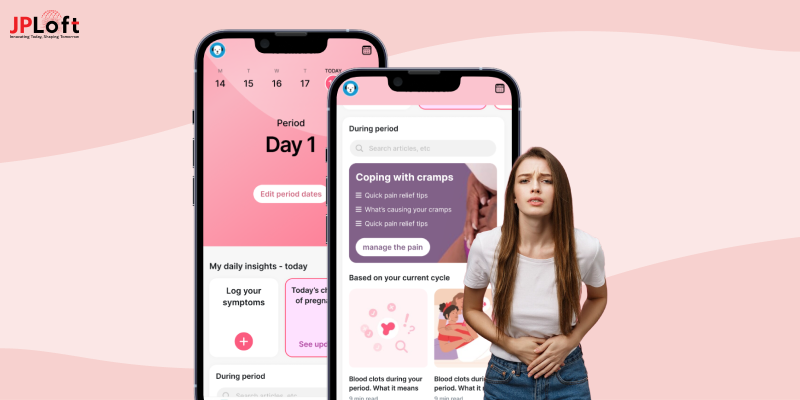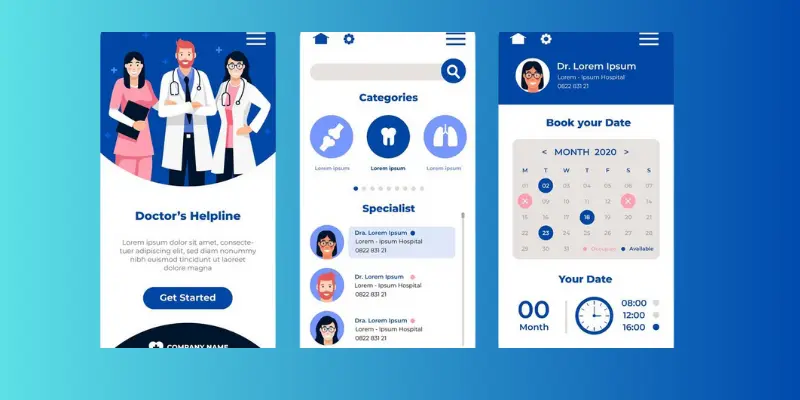Artificial intelligence (AI) is a compelling technology that has revolutionized the world by developing smart technology. It is improving everything from our ability to make decisions to how we consume or interact with data; AI is transforming the realities of many industries, including healthcare. AI healthcare app development solutions are among the areas most anticipated by current technological advancement. Given its capability to transform lives positively the lives of patients, many AI researchers are focused on this subject.
AI usage in healthcare significantly alters how we conduct diagnosis, treatments, and medical treatment. The technology improves workflows and operations that automate repetitive tasks, answer patient queries faster, and create individualized treatment and therapy plans. Therefore, investing in AI medical app development can be profitable as they can benefit researchers, patients, and health experts.
Healthcare is set to change with technology that is on the rise. Technological innovation and the application of artificial intelligence could give patients more personalized and convenient treatment. In 2025, the technology will also add 410 billion dollars to the industry's annual worth.
This article explores the future of AI medical app development in 2025.
Overview Of Artificial Intelligence In Healthcare
The field of computer science that strongly focuses on creating smart machines is called Artificial Intelligence (AI). The field has had a significant impact on healthcare. AI's primary goal is to imitate human intelligence, which allows machines to take on tasks that require some kind of cognition, including thinking, learning, problem-solving, and making decisions.
In healthcare, AI analyzes vast amounts of clinical data within moments. These data could comprise patient charts, diagnostic imaging, medical notes, and research papers. The AI-based mHealth app development is a complicated process that involves several technological advancements that transform the system.
Types Of AI Technologies In Healthcare App Development
AI is changing many areas of healthcare, including guiding research, streamlining administrative procedures, and improving patient care quality. Let's examine the different kinds of AI technology that can be used to develop AI-powered medical apps.
Machine Learning And Deep Learning
Machine learning is among the most discussed aspects of AI, which deals with training models using data. Neural networks and deep learning (subfields that are part of machine learning) are two of the most complex ML elements used in health research and for predicting results. A common ML application in healthcare is to train datasets that are likely to be successful for precise medical diagnosis, i.e., indicating the treatment plan and other plans.
Natural Language Processing (NLP)
Through speech recognition, text analysis, and the ability to translate, NLP understands human language or data that is gathered in different formats other than numerical. AI apps for healthcare use NLP to understand and categorize clinical information and research data in reports, notes, and other documents and help customers by providing conversational AI.
Robotics Process Automation
Robotic process automation (RPA) utilizes computer programs that use servers to follow scripts or rules to automate workflow, making the system smart. Healthcare applications use RPA to automate routine administrative tasks like billing, updating patient records, or obtaining authorizations, improving operations efficiency and productivity.
Speech Recognition
In AI, speech recognition technology can convert human speech into written format, eliminating the necessity to manually enter data. AI medical apps allow conversations with AI to cut down on manual work and human error, which saves time and energy.
Predictive Analytics
This subfield, which combines ML and AI for healthcare, uncovers patterns and relationships in the information to forecast future outcomes. Healthcare professionals, physicians, clinicians, or other experts use the technology to find treatment plans in light of the signs. Furthermore, it will detect when clinics and hospitals are jammed to inform patients of upcoming check-ins, which will help optimize scheduling appointments and improve personnel placement.
Rule-based Expert System
This is the typical "if-then" practice used in healthcare for the clinical decision-making process. The system was developed using human knowledge and rules. However, it is slow and prone to rule conflict. This approach has been replaced with better ML techniques and algorithms.
Benefits Of AI In Medical App Development
Knowing the advantages of AI healthcare app development services is essential. By analyzing these factors, developers and healthcare professionals will better understand the complexities of creating efficient and effective mobile solutions for healthcare.
Improved Diagnosis
The most cutting-edge AI algorithms can analyze medical images like images from X-rays, MRIs, and CT scans with astonishing accuracy, assisting health professionals in diagnosing ailments like fractures, cancers, and other anomalies. AI provides doctors with scientifically supported recommendations to help make better-informed choices.
Innovation in medicine has transformed our approach to medical treatment. Innovative diagnostic techniques enable more precise and timely diagnosis of various illnesses, allowing healthcare professionals to give timely and accurate medical treatment.
Personalized Treatment
Utilizing patient information and advanced algorithms, personalized treatments are now possible. AI creates individualized therapies based on the patient's health characteristics and genetic makeup, which can improve treatment efficacy and decrease the chances of developing adverse reactions.
Predictive Analytics
Healthcare professionals can use predictive analytics to find and prevent possible health problems before they manifest, thus optimizing proactive care. Utilizing AI to analyze patient data, including medical records and risk factors, it is possible to spot specific patterns that could point to some health issues.
Personalized Treatment
Personalized treatments are now possible through patient data and sophisticated algorithms. AI creates individualized treatments dependent on a person's genetic characteristics, which can enhance the effectiveness of treatment and decrease the risk of adverse reactions.
Continuous Learning and Improvement
AI technology can be taught through new information as well as user interaction. This allows them to be more precise with their diagnosis, treatment, and overall operation of healthcare applications.
Implementing AI for healthcare apps could revolutionize healthcare by making medical services specific, efficient, and accessible. It is crucial to address ethical issues, confidentiality of data, and the regulatory framework to ensure that AI technology is safe and appropriately used in the healthcare setting.
Ways AI Can Help Make Improvements In Medical Mobile Apps
AI is a reality in every nook and cranny of healthcare, with its unique capability to tackle challenges through improvement in various aspects of patient care and it is important for healthcare professionals and hire healthcare software developers to understand it. AI can reduce human error and assist doctors and nurses in providing patient care throughout the day.
Chat Automation
We're seeing significant growth in mobile apps, which makes them rivals. Ultimately, each healthcare business is trying to offer the most optimal customer experience and 24/7 service. Retaining their top executives would be difficult since the cost of operations will rise.
Utilizing an artificial intelligence-powered chatbot to answer users' questions is an excellent idea. You don't have to employ an executive to handle chats. An AI chatbot can do this for you without spending additional cash. It can mimic human conversations and helps to streamline interaction between patients, doctors, and hospitals.
Record Management
Electronic health records (EHR) are prominent in the current digital healthcare environment. They store important information about patients and their medical histories. This information allows doctors to make better and more beneficial patient choices.
They can provide an accurate diagnosis, send appointment reminders, review the patient's medical history, etc. Patients can also take advantage of the EHR management system for EHRs, which includes AI-based health apps.
Data Encryption
It's crucial to ensure that the information is safe and confidential while also avoiding cyberattacks. It's good news that AI can provide all-encompassing encryption to all hospitals. Keeping information private and safe is crucial. AI-powered applications provide strong security that can ward off cyberattacks and ensure that all data is secure with complete encryption.
Reduce Overall Expenses
Utilizing AI to diagnose patient problems can increase efficiency and decrease costs. In particular, it eliminates the need for manual and human involvement during data processing or in scanning millions of photos. In turn, patients get faster treatments, which ultimately reduces wait times and admissions.
Safe Surgeries
AI helps in the field of healthcare robotics by allowing the efficient and careful support of surgery within small areas. Robots are certain to be able to precisely handle procedures close to delicate organs and tissues. This can reduce blood loss, the risk of infections, and pain following surgical procedures.
There are many benefits to using AI in surgery. Through the use of AI, the procedure can be performed with smaller incisions. Be created, which are helpful to patients because they speed up recovery and make the procedure much less painful. The treatment of scars is becoming more effective through the use of AI.
Seamless Communication
Hospitals are constantly looking for ways to communicate better with their patients. The need for instant information is also growing, and gateways play a significant part in this. In an age of digital technology, where consumers have high expectations of us, we feel that AI companies should be in a position to provide their customers with the highest quality of service.
This is done by keeping track of patient data with greater precision than traditional healthcare. This allows physicians more time to focus on their care instead of studying the health information for the individual patient. AI can take care of those cases without placing patients in the hospital.
Online Consultation
If you're experiencing an emotional time, one of the first things you think of is finding the most reliable doctor to assist you. If you're desperate and seeking help within your city, locating an excellent physician could be challenging.
Criteria like the person's age and location could differ depending on the amount of cash you have. However, AI-based medical apps will complete the task with utmost precision. The app will give you a customized online consultation that every patient wants to experience.
This is a remarkable accomplishment that machine learning could help achieve. Medical professionals can carry out educated, smart, safe, confidential consultations with patients. Based on the condition and the medical history prior to it, the app can suggest the appropriate course to pursue.
Predictive Analytics for Patient Outcomes
Through predictive analytics provided by AI health professionals, they are able to discern the patient's outcomes and react to them before they cause a catastrophe. Machine learning models use details of the patient to discover trends that could indicate dangers to health. This allows for the earlier identification of people at risk so that correct interventions can be taken in time to improve outcomes.
Treatment Personalization
AI is crucial in identifying patient treatment strategies. Based on analyzing massive databases, such as medical records, genetic information, and previous treatments, AI can determine individualized treatment options.
Virtual Health Assistants
Artificial intelligence-driven health apps are increasing patient engagement and providing the fastest support for patients. AI-powered chatbots can give information regarding symptoms, medications for treatment, and after-treatment services. For example, the AI chatbot interacts with users and records information about their ailments, aiding patients in medical consultations.
Use Cases Of AI In Healthcare App Development
AI and healthcare aid in various medical procedures that help speed up processes to meet workers' needs, increase the patient's experience, and reduce expenses. There are several uses of AI in the healthcare, including:
Medical Imaging Analysis
Through medical imaging analysis, AI apps allow healthcare experts such as cardiologists or radiologists to examine MRIs, X-rays, and scans accurately and promptly. They can identify the presence of diseases and anomalies while preventing any mistakes in the interpretation and providing better diagnosis.
Radiation Therapy
Healthcare apps developed by hire healthcare software developers can collect patients' EHRs to improve their cancer treatment. AI analyzes old medical data to help healthcare providers make more informed choices about radiation doses and the healthiest cells, enhancing the effectiveness and safety of radiation therapy.
Genetic Medicine
One of the most advanced applications that AI technology can make use of AI technology in the field of healthcare is the discovery and development of treatment for genetic conditions. The system analyzes genomic data and anticipates changes that could lead to illness, which allows healthcare practitioners to tailor their treatments.
Diabetic Retinopathy Screening
Through AI Healthcare apps, these applications could serve as a cost-effective diabetes retinopathy detection tool aiding in preventing blindness among diabetic patients. It analyses retinal images to detect more-than-mild diabetes retinopathy, which is, in simple terms, the signs that indicate early eye disease caused by diabetes.
Patient Engagement
AI is used in developing healthcare apps to increase patient involvement in implementing advanced healthcare solutions and making informed decisions regarding their health. Features like health reminders, customized information about the patient, and personalized content increase patient satisfaction.
Administrative Applications
Administrative AI healthcare apps automate routine tasks required of hospitals, clinics, and other health facilities. These entail resource allocation, appointment scheduling based on a doctor's availability, billing, maintaining patient medical records, etc.
Pathology
Thanks to AI and ML, doctors can review medical images, reports, and other reports and help detect any abnormalities that are detected during the examination. This allows physicians to give the highest-accuracy diagnosis.
AI-Driven Drug Discovery
This artificial intelligence-powered platform combines the strengths of data science, biology, and chemistry to analyze the chemical traces present in drugs by identifying their mechanisms and toxicity. This groundbreaking application displays an astonishing ability to reimagine the future of pharmaceutical innovation.
Virtual Assistants And AI Chatbots
The most popular application of AI for healthcare is the development and integration of virtual assistants and chatbots powered by AI into applications. Through conversational AI, this feature allows patients to make appointments or inquire about health-related issues, and healthcare providers can update doctor availability and medical data rapidly.
Automation And Ambient Clinical Intelligence
Through automatic speech recognition (ASR), natural processing of language (NLP), and deep neural networks (DNN), AI healthcare apps analyze the audio of the patient during a virtual conversation to create clinical notes. This helps enhance the system's transparency and decision-making ability. Additionally, they automatize the clinical workflow and routine tasks to provide better patient care.
The Future Of AI In Medical Apps
AI is used to develop new treatments and capabilities for data storage for healthcare applications and will be developed to a higher level in the coming years. One of the AI applications uses machine learning to create personalized treatment plans for patients according to their illness. AI can analyze an individual's genetic material and identify particular mutations specific to them.
This allows the creation of specific therapies which are more efficient than traditional therapies. AI is also utilized to create new medicines, and it is estimated that AI will have been at the forefront of developing 50% of the latest medication by 2025.
Another way AI is being utilized to improve healthcare is by creating digital health assistants. These chatbots, powered by AI, offer patients information about their medical condition, answer the most basic questions, and provide emotional support. Digital health assistants have become ever more sought-after because they provide 24/7 assistance and help for patients even when humans are not available.
AI is being utilized by healthcare app development company to develop wearable technology tracking a person's well-being. These devices can monitor blood pressure, heart rate, oxygen levels, and other vital indicators. As AI is highly adept at patterns, AI medical apps can be used to identify human abnormalities and diseases within our bodies as quickly as possible. The goal is to obtain information from data that humans cannot discern with their naked eyes.
Everybody has heard amazing stories about AI diagnosing cancer ahead of radiologists. However, these are recorded in the most perfect conditions for data. These AI-driven findings have not been made available to people who are not experts. This is due to the confidentiality of data as well as the technology used in professional settings.
Future Predictions And Possibilities
In the wake of the rapid growth in artificial intelligence technologies, it is logical to ask what the future holds for AI in healthcare. In the near future, the use of AI in healthcare is broad and promising. But what is it promising? Let's have a look:
Integration Of AR And VR
With AI's capacity to replicate human brain function and AR/VR's ability to design virtual environments, hospitals can use these techniques for training enhancement and enhancing remote medicine solutions. Imagine surgeons performing complex surgeries within a secure virtual setting that is honed through AR or VR simulations. If enhanced by AI and virtual reality, these simulators of surgical procedures will allow students to learn from realistic situations to improve their learning.
The healthcare system is set to undergo a massive transformation. Physicians and patients, separated by miles, will interact via a virtual environment, like sitting in the same room. AI can analyze the patient's data immediately and provide individualized insights and suggestions for virtual consultations. This will bring the latest level of remote health care. Doctors can perform medical analysis and create treatments in real-time, making each online consultation more efficient and beneficial. It's the future of AI for healthcare, and it will likely be accurate.
Quantum Computing And Healthcare
Artificial intelligence combined with quantum computing and healthcare is set to create an exciting chapter in AI development for healthcare. Imagine a future where finding new medications doesn't take many years but days or even. This is possible due to quantum computing technology that enhances AI's analytical capabilities to detect potential drug substances and decrease trials and errors. It can speed up the process from the laboratory to the patient and rapidly allow life-saving medicines into the market.
AI-Powered Preventive Care
Artificial Intelligence holds enormous promise for preventive medicine in the near future. It is an essential element of quality-based healthcare. Instead of depending on medications to treat health problems after they have arisen, AI-powered preventive apps can help patients develop healthy routines and make lifestyle adjustments to prevent diseases. AI solutions can predict the development of diseases or the appearance of significant issues by utilizing prescriptive and predictive analysis of patient information and all possible variables that influence patient health.
Robotics And Automation
Healthcare will see a more extensive utilization of robots and automated technology. AI-powered robotics will aid in surgeries, patient care, and rehabilitation. These robotics will enhance medical surgeries' effectiveness, accuracy, and safety.
Blockchain For Health Data Management
Blockchain technology handles health information in a safe, non-centralized way, ensuring the security, confidentiality, and integrity of electronic health information. This makes it possible to safely share patient information between healthcare professionals without jeopardizing their privacy.
In Conclusion
There's a lot of potential for AI within the healthcare industry. AI medical apps could improve the way doctors diagnose and improve information sharing, among other things. Due to its capacity for processing large amounts of data and gaining insight from patients, medical apps with AI technology will improve quality of life. It will assist doctors with achieving their objectives, managing their time, and other things. It ultimately enhances healthcare overall significantly.
However, infusing AI into the healthcare sector is not without problems like privacy issues and the necessity of uniformity, as well as ensuring patients' safety and credibility. The solution to these issues is crucial to build solid, trustworthy AI technologies that dramatically improve the quality of care for patients. Due to its capacity to review an enormous quantity of medical information quickly and accurately, AI algorithms can be crucial in helping physicians make sound decisions and give patients better care.













Share this blog